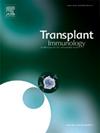Drug-induced acute pancreatitis following dose increase of mycophenolate mofetil in a kidney transplant recipient: A case report and literature review
IF 1.4
4区 医学
Q4 IMMUNOLOGY
引用次数: 0
Abstract
Background
Mycophenolate Mofetil (MMF) is widely used as an immunosuppressive agent in transplant recipients but is rarely associated with acute pancreatitis.
Case presentation
We report the case of a 25-year-old male kidney transplant recipient with juvenile cystinosis who developed acute pancreatitis following an increase in MMF dosage from 500 mg to 750 mg twice daily. The patient had previously experienced complications post-transplant, including posterior reversible encephalopathy syndrome and BK virus-related urethral stricture. A recent episode of acute antibody-mediated rejection, confirmed by biopsy, led to the reintroduction and escalation of MMF alongside Tacrolimus. One month later, the patient presented with severe epigastric pain, vomiting, and diarrhea. Laboratory tests revealed markedly elevated lipase levels (2269 U/L), meeting the Atlanta criteria for acute pancreatitis. Imaging excluded alternative etiologies. The patient's symptoms and lipase levels improved immediately after reducing the MMF dose.
Conclusion
This case highlights the potential for MMF-induced pancreatitis, particularly following dose escalation, and underscores the importance of cautious dosing and close monitoring in transplant recipients.
肾移植受者增加霉酚酸酯剂量后引起的药物性急性胰腺炎:1例报告和文献复习
霉酚酸酯(mycophenolate Mofetil, MMF)作为一种免疫抑制剂广泛应用于移植受者,但很少与急性胰腺炎相关。病例介绍:我们报告一例25岁男性肾移植受者,患有青少年胱氨酸病,每日两次MMF剂量从500mg增加到750mg后发生急性胰腺炎。患者既往有移植后并发症,包括后部可逆性脑病综合征和BK病毒相关尿道狭窄。最近一次急性抗体介导的排斥反应,经活检证实,导致MMF与他克莫司一起重新引入和升级。1个月后,患者出现严重的上腹疼痛、呕吐和腹泻。实验室检查显示脂肪酶水平明显升高(2269 U/L),符合急性胰腺炎的亚特兰大标准。影像学排除了其他病因。减少MMF剂量后,患者的症状和脂肪酶水平立即改善。结论:该病例强调了mmf诱发胰腺炎的可能性,特别是在剂量增加后,并强调了谨慎给药和密切监测移植受者的重要性。
本文章由计算机程序翻译,如有差异,请以英文原文为准。
求助全文
约1分钟内获得全文
求助全文
来源期刊

Transplant immunology
医学-免疫学
CiteScore
2.10
自引率
13.30%
发文量
198
审稿时长
48 days
期刊介绍:
Transplant Immunology will publish up-to-date information on all aspects of the broad field it encompasses. The journal will be directed at (basic) scientists, tissue typers, transplant physicians and surgeons, and research and data on all immunological aspects of organ-, tissue- and (haematopoietic) stem cell transplantation are of potential interest to the readers of Transplant Immunology. Original papers, Review articles and Hypotheses will be considered for publication and submitted manuscripts will be rapidly peer-reviewed and published. They will be judged on the basis of scientific merit, originality, timeliness and quality.
 求助内容:
求助内容: 应助结果提醒方式:
应助结果提醒方式:


